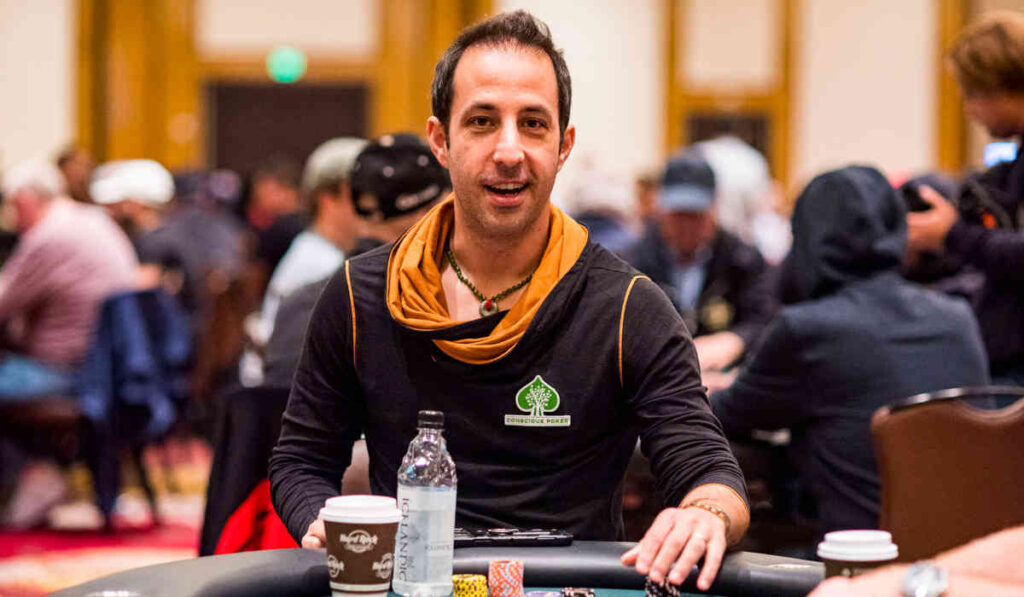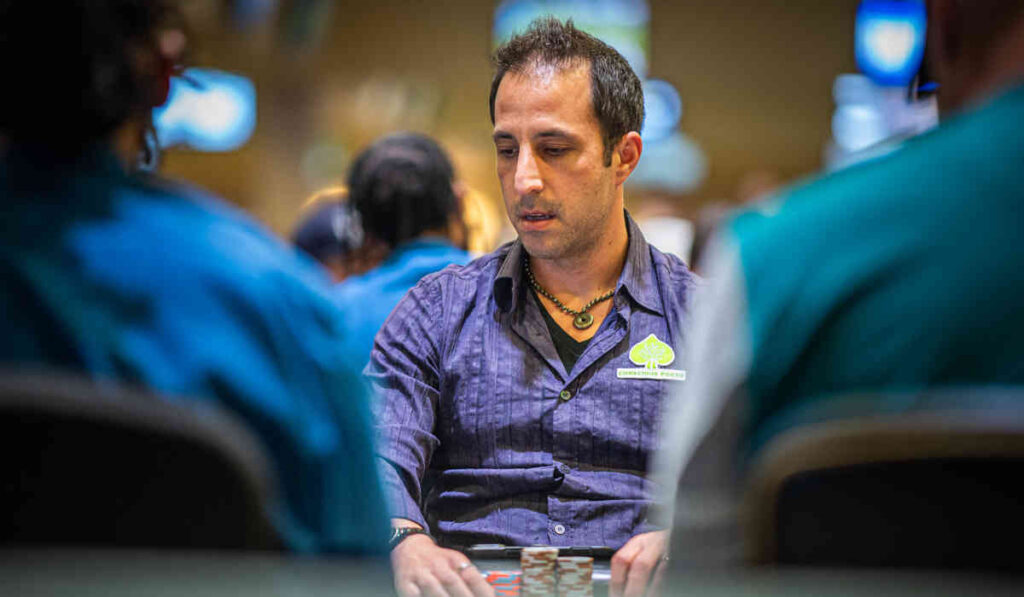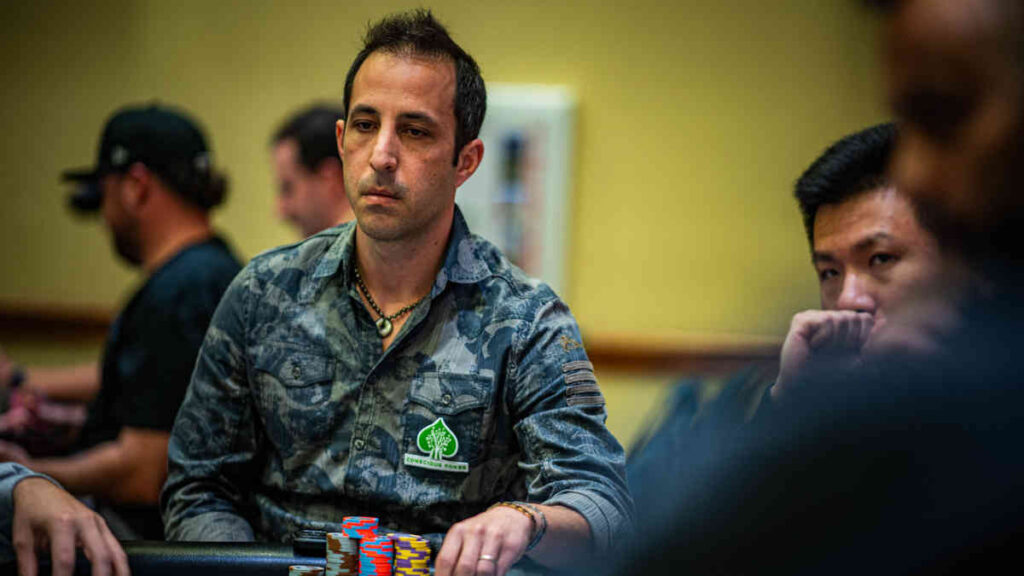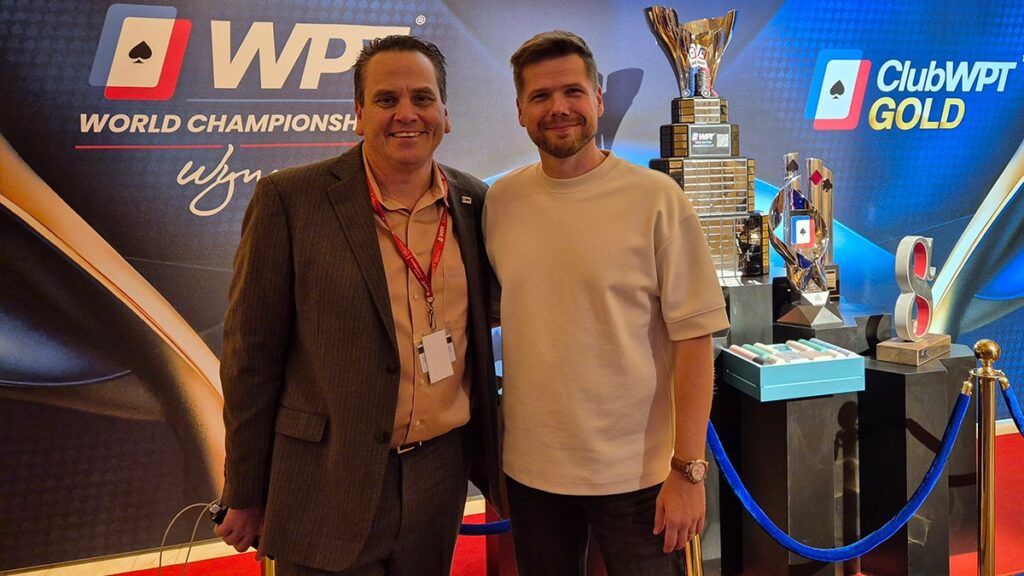Images courtesy of World Poker Tour
Alec Torelli doesn’t just play high-stakes poker — he approaches it like a craft, shaped by precision, discipline, and a sharp understanding of human nature.
In this installment of Inside the Poker Circles, drawn from Between the Blinds: Interviewing Poker Professionals by Sara O’Connor (coming this fall), we meet a veteran of the international poker scene whose success spans both elite cash games and tournaments worldwide.
Torelli’s approach goes beyond poker strategy—it’s about understanding people, pressure, and how to make the right decision when it matters most.
Off the felt, he’s turned that knowledge into value for others, coaching players on performance, mindset, and long-term success through both poker and entrepreneurship.
In this interview, Alec shares the key moments that shaped his path, the principles that guide his game, and how poker continues to influence every part of his life.
Do you remember your first time playing? If so, what was it like?
The first time I remember playing was with my family. We’d play various poker games at family gatherings during the holidays. It was stimulating and so fun to be able to play poker games for real money.
The first “real” time I played, I was sixteen and got invited to a friend’s house to play in a home game. Chris Moneymaker had just won, so all the teenagers were playing. I won $12, so, naturally, I got hooked.
It was a very exhilarating thing to play poker and win against friends. It was like my version of sports; it was my way of competing with all of the other cool kids.
When I was eighteen, I dropped out of college to play professionally. When I declared myself a pro, it was like, “Oh wow, I’m not going to school anymore. I really am a pro.”
I started to behave like a pro and gave poker the respect of being a pro. I took and take the game very seriously. I needed to win. That was a huge moment for me.
What’s it like excelling in both cash games and tournaments? Which is your favorite and why?
Honestly, I think it depends on the stage of my career. I like tournaments because they have a clearly defined winner. I strive to improve and want to showcase my skills through a final finish or by finishing deep.
Most of my career, I’ve played cash games. They’re the most stable. There’s more money in cash games. Cash games are a better hourly rate. I played those most of my career.

Now, I’m not trying to grind every day. I’m trying to compete for myself and the love of the game, which brings me to tournaments. It’s important to understand yourself and how your desires in your career change. I love tournaments now after the 2023 WSOP.
Maybe in two years I’ll be more excited about cash games, because I’ll have missed them. It’s nice to oscillate between the two, and there’s a different skill component to each. Switching occasionally is really exciting.
What’s your personality like on the felt?
I am usually quite talkative and like to get to know people. I’ve made some amazing connections in poker. I love to engage and get to know people. I think it makes poker more fun, because the time passes faster.
Everyone has an interesting story. With poker, everyone comes from a different walk of life. It’s fascinating hearing everyone’s stories. I have an intrinsic desire to meet people and get to know their stories.
Sometimes, I go into a mode where I’m laser-focused and in my head, so I’ll check out for an hour or two. I oscillate between these polarities. It’s a long time when you’re there for twelve hours. You can’t just be in one gear the whole time.
Where do you see yourself in five to ten years?
It’s hard to say. I see myself doing more in the realm of sharing lessons from poker to how they apply to life and business. I like thinking about poker and how it makes people navigate their lives better. Improving poker skills can translate into the business and investing world.
I want to share that knowledge with other people. Specifically, I want to do more on the investing side than I have in the past. It’s a game like playing poker, but with different rules.
There’s no amount of money if I earned, that I would then quit playing poker. It’s a game I love intrinsically, so I always see myself playing. You’ll play what you’re drawn to play. I’ll play for a month, then be off for a month. I’ve gotten good results by playing when I want and working on other things.
Have you noticed any common mistakes or misconceptions that new players have about poker?
They underestimate the role of luck in the short-term and they overestimate the role of luck in the long-term. They don’t realize how much variance there is in the short term.
Of course you’re card dead for two hours; that happens every other session! However, people get surprised by it. That’s just part of the distribution of cards.
You’re only going to cash about 60% of your sessions as a good cash player and 20% as a good tournament player. Those things are so normal, you need to become desensitized against them and bounce back. Otherwise, you’ll be shocked when you get punched in the face.
As a boxer, you learn to take punches. Don’t be surprised by the punches you’re going to need to take as a poker player. People are often used to meritocracy, but you can do everything right, and still lose in poker.
In the long-term, you’ll have people that say, “I’ve had such an unlucky past six months.” And no, you haven’t; the math doesn’t support the notion that the distribution is due to luck. You need to look at your game and study.
If you play long enough, luck is near nonexistent, especially in cash games. There’s this polarity between understanding the wild nature of luck in the short-term, but in the long-term, there’s almost no luck.
From your experience, what are the most common tells or behaviors that give away a player’s hand strength?
People want an equivalent to a slam dunk pickup line for women for poker tells, but that’s not how it works. It’s the non-obvious cues where all the value is. You need to read the situation and adapt.
It’s the same as meeting and connecting with someone; there are general rules, but the real mastery is in the nuance of the situation and being able to adapt to it. I know that people would like a simple answer, but human behavior isn’t that simple.
Do you have any pre- or post-game rituals you practice?
I have a lot. I guess the short answer is that I think about my performance in poker as an athlete would in a competition. I wouldn’t put anything off limits. If an athlete would do it, I’m game.
I try to do it all to develop good habits – I eat healthy, stay hydrated, study the games, run the sims, and review in the lab after the game. I try to model myself after the best athletes.
I’ve worked with mental coaches to improve my game as well. You never are suddenly finished, i.e., are now perfect, and are done improving. That’s not how infinite games work. You’re only done with poker when you quit the game.
Do you have a favorite hand and, if so, what is it and why?
I like the jack/ten suited. With aces, you’re always hoping not to get beat. It’s more fun to be drawing than to be made; there are more ways to play it. You can bluff it and hit that and so much more.
The reason why it’s my favorite poker hand is because I called an all-in with it during a home game when I knew my friend had aces. I felt strongly I would win. Sure enough, I drew out and busted him!
Do you or did you ever play differently against women?
The short answer is no. However, I think that the “playing differently” is not because they’re women; it’s more because when you play with people for the first time and you have no reads on them, you have to empirically think about how other people who share those characteristics are willing to play.
Do I play differently against seniors? No. But when I first sit down at the table, I think about how, on average, senior players play. Sometimes, when you first sit down with zero information, you do a tiny bit of judging, but that’s about it.

Don’t judge a book by its cover until you read the book. You have to play with players for several hours to be able to read them well. When looking at groups of people, not just women, you do stereotype a bit, but that’s the risk.
You need to be adaptable to the label you created. If you’ve labeled someone, then you’ve already judged a book by its cover instead of reading it.
I’m careful to play the game with the information I have, rather than the information that I assume I could have. I don’t care about your demographics; I care about your betting patterns and how to counteract them.
How did you celebrate one of your first or most memorable wins?
My first win and most memorable win are different. Moreover, a first win is different from a win later in your career.
The first time I won an online all-night tournament for a couple grand was when I was in high school. I took all my friends out to Chili’s. They give you endless tortilla chip bowls, but I bought two of them instead of waiting for them to be refilled. It felt very lavish. The first win hits harder in a way.
Even other wins that reaped a bigger profit can feel like a loss. I had a lot of mixed emotions when I finished third this year at a WSOP event, because I lost the tournament. Even though I won more money than I ever won when I was a kid, it still felt like a loss.
For a tournament, you’re still wondering what you could have done to win even if you ran really deep. It’s heartbreaking to get so close.
With cash games, I’m not that lavish or flashy. The energy and positivity of the event feels so good. You sit and get a pastry and look back on your day and you feel like you’re sitting on top of the mountain after climbing Everest.
As soon as you leave that pastry shop, you know you’re not on top again and you need to climb a new mountain. The moments when I’m at the top are sweet to me, because I know how fleeting it is at the top.
When I’m up there, it’s the internal feeling of joy rather than a purchase I make — the sensation over the superficial.


